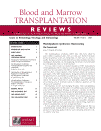Autoimmune Diseases: When Homeland Security Fails
by John R. Wingard, Editor
Autoimmune disease can be viewed as an insurrection by security forces charged with protecting us from lurking outside dangers. What ensues is either smoldering conflict to attrition or large-scale open warfare. Treatments have generally been disappointing. Autoimmune phenomena are sometimes consequences of both autologous and allogeneic hematopoietic cell transplantation (HCT). So, why would one consider treating autoimmune diseases with HCT?
Serendipity can fuel great initiatives. The incidental findings of concomitant autoimmune diseases improving in patients undergoing HCT for other reasons have been well documented in the literature. Animal models have amply demonstrated the potential of transplantation to correct autoimmune diseases. So, certainly there were reasons to believe that HCT is worthy for study. Now, clinical investigators have compiled an impressive array of early clinical data suggesting the potential for HCT to have an important role in the treatment of human autoimmune diseases.
In this transcript of a symposium held at the 2004 Tandem BMT Meetings in Orlando, Florida, the current status of what we know and what is being learned in clinical trials now underway and those in the planning stages is reviewed
Much has been learned. Rheumatologists and neurologists have set the stage by defining natural history and risk factors and developing standardized criteria for disease status and response. Transplanters have added knowledge about principles of conditioning regimens, identified treatment risk factors, and defined some of the limits of who might be helped and who cannot.
Yet much work lies ahead. And, of course, obstacles. There are other competing alternative therapies to test, many with less risky complications. What about high-dose immunosuppressive therapy without stem cells? Adjunctive studies to investigate in detail how HCT affects the dysregulated immunity are needed, to increase our understanding of pathogenesis and provide suggestions for yet further interventions. The randomized trials are ambitious and need wide support for timely completion. Only then will we know if an armed counterinsurgency will win the day.
Download a PDF version of the full issue.

